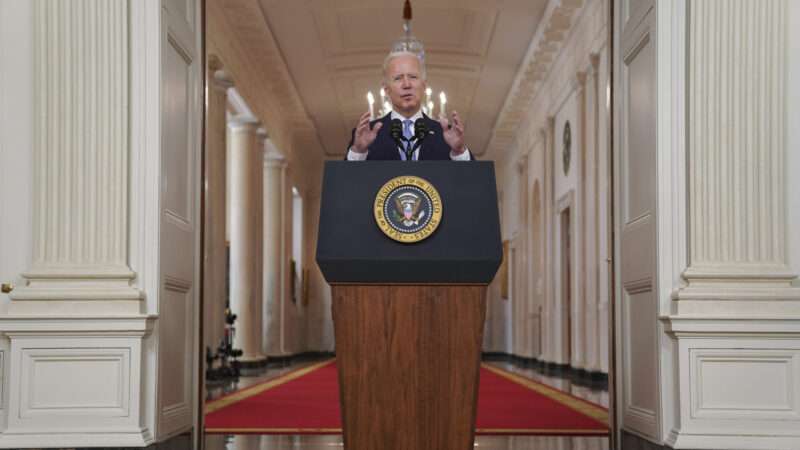
One day after nearly 20 years of war in Afghanistan came to an end, President Joe Biden said he was closing the book on an inglorious and expensive phase of American foreign policy.
“This decision about Afghanistan is not only about Afghanistan,” Biden said in a speech Tuesday from the White House. “It’s about ending an era of major military missions to remake other countries.”
That’s a remarkable, and welcome, sentiment to hear expressed by an American president.
Most Americans had long ago soured on the idea of nation-building in Afghanistan (and Iraq) and had voted for a series of presidential candidates who promised (and then failed) to put an end to America’s longest war. In the end, the war that enjoyed bipartisan support for years was ended in a bipartisan fashion. Former President Donald Trump put the Pentagon on the clock when his administration reached a deal with the Taliban to withdraw by May 2021. Biden postponed that deadline but held firm when it mattered.
In doing so, he’s created an opportunity to chart a new way forward for America’s foreign policy. Far from promising isolationism, Biden said Tuesday that “human rights will be the center” of his foreign policy. “But the way to do that is not through endless military deployments,” he added, stressing that America should instead use its prestigious diplomatic and economic tools to work with belligerent countries. If that shift materializes, it should be welcomed by both Americans and the rest of the world.
Much of Biden’s speech on Tuesday was aimed directly at the war hawks who have criticized his administration’s handling of the withdrawal. In particular, Biden took aim at the bizarre talking point that has emerged in recent weeks suggesting that the status quo in Afghanistan was sustainable prior to the departure of U.S. troops and the ensuing collapse of the Afghan government.
“The real choice,” Biden said, was “leaving or escalating.”
“I was not going to extend this forever war,” he added, “and I was not extending a forever exit.”
He’s right. The lack of bloodshed between the Taliban and U.S. forces over the past year and a half was the direct result of America’s promise to withdraw. Keeping American forces in Afghanistan past the August 31 deadline would have invited more fighting and the pointless loss of more American lives.
Claims about the sustainability of the past year’s cessation of hostilities were never more than a thin cover for perpetual, neverending war. When CNN gave John Bolton, one of the chief architects of the disastrous nation-building foreign policy of the past decades that Biden is now seeking to undo, a platform to criticize Biden’s withdrawal last week, Bolton said the “fundamental” error Biden had made was “withdrawing at all.” The mask slips.
Reasonable people can disagree about how much blame Biden deserves for the messy withdrawal. Certainly, it is shameful that so many Afghans who helped America over the years seem to have been left behind—in some cases because of bureaucratic holdups that should be blamed on America’s broken immigration system, not because the timetable for withdrawal was insufficient.
What everyone on this side of defense contractors and Bolton should be able to agree upon, however, is that America was no longer pursuing any meaningful national security objectives in Afghanistan.
With an eye towards the future, Biden said Tuesday that America should learn two lessons from the nearly two-decade misadventure in Afghanistan. First, the military should be used only to pursue missions “with clear, achievable goals, not ones we’ll never reach.” Second, those missions must be focused on “the fundamental national security interests of the United States.”
The war in Afghanistan failed on both counts. Biden was right to throw the ball back to the hawks.
“To those asking for a third decade of war in Afghanistan, I ask: What is the vital national interest?” Biden said.
There isn’t one. There hasn’t been one in a long time. The war in Afghanistan is over. For that, we should be thankful.
from Latest – Reason.com https://ift.tt/3gL8IQU
via IFTTT